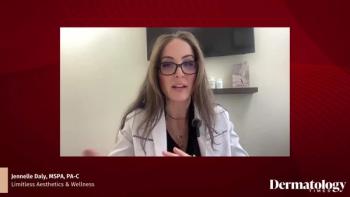
Partner with Hair Stylists and Give Them the Knowledge to Spot Scalp Concerns
The HEROES program wants to make it easier for stylists to recognize scalp conditions and advise their clients to seek medical help.
Hairstylists and barbers are in a unique position to observe skin conditions of the scalp up close and to open a dialogue with their clients when they see a problem. This can be an awkward conversation to start, and without medical knowledge many stylists feel unprepared and uncomfortable talking with their clients about scalp concerns.
To overcome these issues, the Global Healthy Living Foundation (GHLF) announced in a press release, “
The free program, which offers online educational content and resources, provides information about common skin diseases of the scalp. Text message support and a social media toolkit are also available so stylists can help raise awareness of scalp health and destigmatize chronic diseases of the scalp.
The campaign was created by, with, and for stylists, salons, and barbershops with input from patients and dermatology providers. In a GHLF survey, 96% of stylists (n=118) said they know what psoriasis is but only 27% have conversations with their clients about it.
In an interview with Dermatology Times®, Elle de Moll, MD, Dermatology Physicians of Connecticut, Norwalk and Shelton, Connecticut said, “I think it’s an interesting opportunity to extend dermatology services without needing more dermatologists.” She added, “In reaching out to hair stylists and barbers it provides some information about scalp and dermatology and skin care to people in their current, comfortable setting.”
Of those stylists who received information about skin conditions and were interested in the HEROES program, 98% said they would suggest a client seek medical care if the client shows signs of a skin condition.
In a press release, Loyd Godwin, MD, founder of Dermatology Physicians of Connecticut, Norwalk and Shelton, Connecticut, who serves as one of the medical advisors of the program, said, “As a dermatologist, I’m excited that GHLF’s HEROES program will help beauty professionals educate their clients about what a healthy scalp looks like and advise action if additional support from a dermatologist or medical professional is needed.”
The program also highlights that skin diseases might present differently in those with skin of color and seeks to educate salon professionals on those differences. For example, skin discoloration may be less obvious in those with skin of color. It oftentimes looks more violet than red, making it more challenging for patients to spot.
“Over time, our stylists, barbers, and related beauty professionals become close confidants, someone we share personal stories with while sitting in the chair. Building on those trusting relationships, we created the HEROES program to spark positive health conversations, reduce stigma, and accelerate diagnosis to improve health outcomes for patients with chronic skin conditions,” said Sarah Shaw, GHLF’s BIPOC community outreach senior manager, in a press release.
To learn more about the Salon HEROES program created by the Global Healthy Living Foundation and to access free, educational resources for stylists and patients, visit
Reference
- New Global Healthy Living Foundation HEROES survey and educational campaign highlights role of salons and barbers to promote skin and scalp health. News Release. Global Healthy Living Foundation. June 7, 2023.
https://ghlf.org/ghlf-news/are-salons-and-barbershops-the-missing-piece-to-facilitate-better-skin-and-scalp-health/
Transcript
de Moll: I'm Elle de Moll. I am a board-certified dermatologist working in Connecticut.
Dermatology Times: Could you tell us more about the Health Education+Reliable Outreach+Emphatic Support, or HEROES, program?
de Moll: I think it's an interesting opportunity to extend dermatology services without needing, you know more dermatologists, which is a great opportunity because it takes a lot longer to have more doctors meet our patient's needs. And in reaching out to hair stylists and barbers, it provides some information about scalp and dermatology and skin care to people in their current, comfortable settings so that barbers and hairstylists can provide potential patients with information about things that they're seeing on their scalp or worrisome signs of psoriasis, eczema, different forms of hair loss, and be a launching off place for seeking health care, particularly in communities with skin of color that might not have as ready access.
Dermatology Times: What prompted the HEROES program?
de Moll: There is an overarching theme in the global Healthy Living Foundation for chronic disease and people who are suffering with just the chronicity and regular day to day struggles of having a chronic illness and dermatology is not immune to that. People often think of dermatology is, as all dermatologists know, and they might think of acne or warts, but they're not thinking about debilitating diseases. They're not thinking about alopecia universalis or psoriasis more than just a little 2% body surface area other than people who have very prominent psoriasis and something that's impacting their quality of life day-to-day. So I think it was a very great segue for the organization to kind of find ways that they can help people who are maybe not even realizing they're living with chronic illnesses. They may be too ashamed to go to a doctor, they may not know it's a diagnosis. They may think it's a hygiene problem or something that, it's something that's stopping them from seeking care. And so we're really kind of entering into a new population.
Dermatology Times: How did you personally get involved with the program?
de Moll: So Loyd Godwin, who is on the board of directors, or not board of directors, on the board somehow. And so my background is in anthropology and as an undergrad, and in social justice in general, volunteering at different free clinics and things and fire houses, and whatnot. So it was a logical next step for me to become involved in this project as well.
Dermatology Times: What would you like your physician peers to know about the program?
de Moll: It is a great launching off point for dermatologists to reach out within their community. And let hair stylists and salons and barbershops know that this resource exists. It's a very readily accessed website. And one more for patients, [inaudible] or more as a stylist with lots of resources, questions, you can submit questions that you might have and get an answer back. It's very user-friendly. And so it should be very readily available to anybody. I think, to kind of increase, increase an open dialogue, I think particularly with our skin color patients, but particularly with maybe areas outside of somebody's general catchment area to try to bring awareness and services to people who might not be getting them.
Dermatology Times: Is there anything you’d like to add?
de Moll: Part of the movement in dermatology in general to equalize access to populations, including the skin of color population, and there's a big push in dermatology with the skin of color group that that's working on equalizing things. And I think this is something that's doable now, it doesn't need to be upscaled, and lets us each take a step in working with our own communities to move in that direction.
[Transcript edited for clarity]
Newsletter
Like what you’re reading? Subscribe to Dermatology Times for weekly updates on therapies, innovations, and real-world practice tips.









